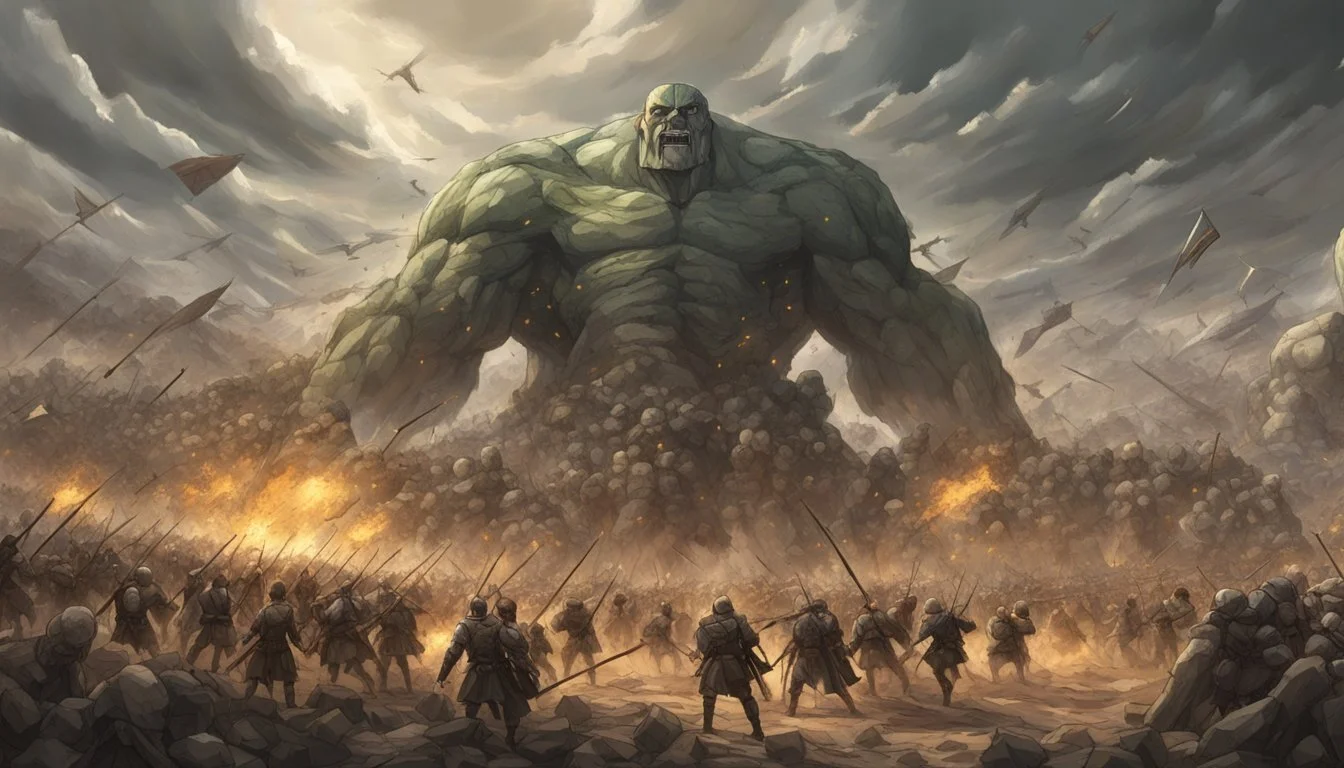Exploring AOT Personality Types: Unpacking the MBTI of Attack on Titan Characters
Attack on Titan captivates audiences with its complex characters and intricate storylines. The personalities of these characters play a crucial role in driving the narrative forward and creating compelling interactions. By examining the Myers-Briggs Type Indicator (MBTI) personality types of Attack on Titan characters, viewers can gain deeper insights into their motivations, behaviors, and relationships within the series.
The MBTI system categorizes individuals into 16 distinct personality types based on four key dimensions: Extraversion/Introversion, Sensing/Intuition, Thinking/Feeling, and Judging/Perceiving. Applying this framework to Attack on Titan characters reveals a diverse range of personalities that contribute to the richness of the story. From Eren Yeager's passionate and impulsive ISFP nature to Armin Arlert's analytical and strategic INTP mind, each character's MBTI type influences their actions and decisions throughout the series.
Understanding the MBTI types of Attack on Titan characters can enhance viewers' appreciation of the show's character development and interpersonal dynamics. It offers a new perspective on familiar characters and provides insights into their strengths, weaknesses, and potential growth trajectories. This analysis can also help fans predict how characters might react in future situations, adding an extra layer of engagement to the viewing experience.
Overview of Myers-Briggs Personality Types
The Myers-Briggs Type Indicator (MBTI) is a widely used personality assessment tool. It categorizes individuals into 16 distinct personality types based on four key dimensions of personality.
Understanding MBTI
MBTI was developed by Isabel Briggs Myers and her mother, Katharine Briggs, based on Carl Jung's theory of psychological types. The assessment aims to identify a person's preferences in how they perceive the world and make decisions.
The 16 personality types are represented by four-letter codes. Each letter corresponds to a specific preference within the four dimensions. For example, INTJ represents Introverted, Intuitive, Thinking, and Judging preferences.
MBTI is used in various settings, including career counseling, team building, and personal development. It provides insights into individual strengths, communication styles, and potential areas for growth.
Dimensions of Personality in MBTI
The MBTI framework focuses on four key dimensions of personality:
Extraversion (E) vs. Introversion (I): This dimension relates to how individuals gain energy and direct their attention.
Sensing (S) vs. Intuition (N): This aspect deals with how people gather information and perceive the world around them.
Thinking (T) vs. Feeling (F): This dimension concerns how individuals make decisions and form judgments.
Judging (J) vs. Perceiving (P): This final aspect relates to how people approach the external world and structure their lives.
These dimensions combine to create the 16 distinct personality types, each with its own set of characteristics, strengths, and potential challenges.
Analysis of Main Characters in Attack on Titan
Attack on Titan features complex characters with distinct personalities that drive the narrative. Their psychological profiles and motivations shape their actions and relationships throughout the series.
Eren Yeager's Personality Type
Eren Yeager exhibits traits of an ENFJ (Extraverted, Intuitive, Feeling, Judging) personality type. His strong sense of justice and desire to protect humanity fuel his determination. Eren's charisma and ability to inspire others align with ENFJ characteristics.
He often acts on impulse, driven by intense emotions. This trait leads to both heroic moments and controversial decisions. Eren's idealism and strong convictions sometimes clash with reality, causing internal and external conflicts.
His personality evolves dramatically throughout the series. Initially focused on eradicating Titans, Eren's goals shift as he uncovers hidden truths. This transformation reflects his complex nature and the impact of his experiences.
Mikasa Ackerman's Psychological Profile
Mikasa Ackerman displays traits consistent with an ISTJ (Introverted, Sensing, Thinking, Judging) personality type. Her unwavering loyalty and protective nature towards Eren are defining characteristics.
Mikasa's calm demeanor in crisis situations stems from her logical thinking and practical approach. She excels in combat, relying on her exceptional physical abilities and quick decision-making skills.
Her emotional attachment to Eren sometimes conflicts with her rational side. This internal struggle adds depth to her character and influences her choices throughout the series.
Mikasa's backstory of loss and trauma shapes her personality, contributing to her stoic exterior and fierce determination to protect those she cares about.
Armin Arlert: A Case Study
Armin Arlert exemplifies an INFJ (Introverted, Intuitive, Feeling, Judging) personality type. His strategic thinking and ability to see the bigger picture make him a valuable asset to the Survey Corps.
Despite initial physical weakness, Armin's intelligence and analytical skills compensate. He often devises creative solutions to complex problems, showcasing his intuitive nature.
Armin's empathy and understanding of human nature allow him to connect with others and mediate conflicts. This trait becomes increasingly important as the series progresses.
His character development is marked by growing confidence and leadership abilities. Armin's journey from self-doubt to self-assurance is a central aspect of his arc.
Levi Ackerman's Character Analysis
Levi Ackerman fits the profile of an ISTP (Introverted, Sensing, Thinking, Perceiving) personality type. His exceptional combat skills and quick thinking make him humanity's strongest soldier.
Levi's blunt communication style and apparent emotional detachment stem from his pragmatic nature. He prioritizes efficiency and results over social niceties.
Despite his tough exterior, Levi shows deep care for his comrades. His leadership style balances strict discipline with genuine concern for his squad's well-being.
Levi's past as a criminal in the Underground City influences his worldview and actions. This background contributes to his complex character and moral ambiguity.
Historia Reiss and Her Persona
Historia Reiss demonstrates characteristics of an ENFJ (Extraverted, Intuitive, Feeling, Judging) personality type. Her journey from the meek Krista Lenz to the assertive Queen Historia showcases significant character growth.
Initially, Historia hides her true self behind a façade of kindness. This behavior stems from her desire to be liked and her troubled past.
As she embraces her true identity, Historia displays strong leadership qualities. Her empathy and ability to connect with others make her an effective ruler.
Historia's internal conflict between duty and personal desires adds complexity to her character. Her choices often reflect a struggle between her individual needs and the greater good of humanity.
Supporting Characters' Personality Insights
Attack on Titan's supporting cast displays a range of complex personalities that enrich the story. These characters exhibit distinct traits that shape their roles and relationships within the series.
Jean Kirstein and Leadership Qualities
Jean Kirstein starts as an arrogant and self-centered individual but evolves into a capable leader. His analytical mind and strategic thinking make him invaluable to the Survey Corps. Jean's INTJ personality type shines through in his ability to assess situations critically and make tough decisions.
He often clashes with Eren due to their differing perspectives, but this friction helps both characters grow. Jean's leadership style is pragmatic and focused on survival, which contrasts with Eren's more idealistic approach.
As the series progresses, Jean demonstrates increased empathy and a stronger sense of responsibility for his comrades. His growth from a selfish trainee to a respected leader showcases the series' theme of personal development in the face of adversity.
Connie Springer: The Loyal Friend
Connie Springer embodies the ESFP personality type with his energetic and fun-loving nature. Despite the grim circumstances, Connie often provides much-needed moments of levity for the group.
His loyalty to his friends and fellow soldiers is unwavering. Connie's straightforward thinking and quick reflexes make him a valuable asset in combat situations.
Throughout the series, Connie faces personal tragedies that test his resolve. His hometown's destruction and his mother's transformation into a Titan deeply affect him. Yet, Connie's resilience and commitment to his comrades never falter.
Connie's character arc demonstrates how even those with seemingly simple personalities can display great depth and strength when faced with extreme challenges.
Sasha Braus: More Than Comic Relief
Initially introduced as comic relief, Sasha Braus proves to be a complex character with hidden depths. Her ESFP personality type is evident in her impulsive nature and love for food.
Sasha's exceptional hunting skills and sharp instincts make her a crucial member of the Survey Corps. Her rural background gives her a unique perspective and set of abilities that complement the team.
As the story unfolds, Sasha shows remarkable growth. She overcomes her initial fears and becomes a brave and reliable soldier. Her empathy and understanding of human nature allow her to connect with others in meaningful ways.
Sasha's character development illustrates how initial impressions can be misleading. Her journey from a food-obsessed cadet to a skilled and compassionate warrior adds depth to the narrative.
Reiner Braun's Complex Nature
Reiner Braun stands out as one of the most psychologically complex characters in Attack on Titan. His ESTJ personality type is evident in his strong sense of duty and leadership qualities.
Reiner's dual identity as both a Warrior and a soldier creates intense internal conflict. This struggle manifests in his actions and relationships with other characters.
His protective nature and desire to be a "big brother" figure to his comrades clash with his mission as the Armored Titan. This internal turmoil leads to severe psychological stress and dissociative episodes.
Reiner's character explores themes of guilt, loyalty, and the impact of indoctrination. His journey forces readers to question the nature of heroism and villainy in war.
The Antagonists' Personality Aspects
The primary antagonists in Attack on Titan showcase distinct personality traits that drive their actions and motivations. These characteristics shape their roles within the story and influence their interactions with other characters.
Zeke Yeager's Exemplary ENTP Traits
Zeke Yeager, the Beast Titan, embodies many qualities associated with the ENTP personality type. His strategic thinking and innovative approach to problem-solving are hallmarks of this personality. Zeke's ability to see the bigger picture allows him to devise complex plans.
He thrives on intellectual challenges and often engages in debates to test his ideas. This trait is evident in his interactions with other characters, where he frequently presents unconventional solutions.
Zeke's charisma and persuasive nature enable him to gather followers and convince others of his vision. His adaptability in various situations showcases the ENTP's quick-thinking capabilities.
Annie Leonhart's ISTP Tendencies
Annie Leonhart displays characteristics commonly associated with the ISTP personality type. Her calm and collected demeanor in high-pressure situations reflects the typical ISTP trait of remaining level-headed during crises.
Annie's exceptional combat skills and adaptability in battle demonstrate the ISTP's natural affinity for hands-on problem-solving. She excels in analyzing her surroundings and making split-second decisions.
Her tendency to work independently and maintain emotional distance from others aligns with the ISTP's preference for autonomy. Annie's pragmatic approach to her mission and her ability to detach herself from emotional consequences further support her ISTP classification.
Bertholdt Hoover: The Silent Threat
Bertholdt Hoover, while less outspoken than his counterparts, possesses a unique set of personality traits that make him a formidable antagonist. His quiet nature and tendency to follow orders without question suggest an introverted personality type.
Bertholdt's ability to remain calm under pressure and his strategic thinking in battle situations indicate a logical and analytical mindset. His loyalty to his mission and comrades, despite personal doubts, showcases a strong sense of duty.
His internal struggle with the morality of his actions reveals a deep, reflective side to his personality. Bertholdt's capacity for empathy, despite his role as an antagonist, adds complexity to his character and sets him apart from more one-dimensional villains.
The Role of Personality in Conflict
Personality traits significantly influence how individuals approach and handle conflict situations. In Attack on Titan, characters' distinct personalities shape their responses to the ongoing struggle against the Titans and internal strife within the walls.
Interpersonal Dynamics among Titans
The Titans, despite their seemingly mindless nature, exhibit distinct behavioral patterns that mirror personality types. Some Titans display aggressive tendencies, actively pursuing humans with relentless determination. Others appear more passive, wandering aimlessly until provoked.
The Armored Titan and Colossal Titan demonstrate strategic thinking and coordination in their attacks on the walls. This suggests a level of intelligence and personality beyond that of typical Titans. Their actions reflect careful planning and execution, hinting at complex motivations driving their behavior.
Eren's Titan form showcases a fierce, almost berserker-like personality. His transformation amplifies his determination and rage, often leading to unpredictable and volatile actions in battle.
Decision-Making in the Survey Corps
Within the Survey Corps, diverse personalities clash and complement each other in high-stakes situations. Erwin Smith's calculated and visionary leadership style often conflicts with Levi Ackerman's more pragmatic and direct approach.
Hange Zoë's eccentric and curious nature drives their scientific pursuits, sometimes at odds with the military's immediate goals. Their enthusiasm for Titan research occasionally creates tension with more cautious team members.
Armin Arlert's analytical mind and strategic thinking prove invaluable in crisis situations. His ability to remain calm and devise complex plans contrasts sharply with Jean Kirstein's more impulsive decision-making style.
Mikasa Ackerman's unwavering loyalty to Eren influences her choices, often prioritizing his safety over broader mission objectives. This sometimes creates conflict with team members who advocate for more balanced strategies.
MBTI Types among Anime Characters
MBTI personality types offer insights into the motivations and behaviors of anime characters. This framework helps viewers understand character dynamics and relationships within series like Attack on Titan.
Protagonists and MBTI Types
Eren Yeager from Attack on Titan exemplifies the ISFP personality type. His passionate nature and strong desire for freedom align with ISFP traits. ISFPs are often action-oriented and live in the moment, which matches Eren's impulsive decision-making.
Other anime protagonists showcase different MBTI types. For example, Light Yagami from Death Note displays INTJ characteristics with his strategic planning and long-term vision. Naruto Uzumaki embodies the ENFP type through his enthusiasm and ability to inspire others.
ENTP protagonists like Edward Elric from Fullmetal Alchemist exhibit quick thinking and adaptability in challenging situations.
Supporting Characters and Their Types
Supporting characters in anime often represent a diverse range of MBTI types, adding depth to storylines. In Attack on Titan, Armin Arlert fits the INTP profile with his analytical mind and strategic thinking.
Mikasa Ackerman showcases ISTJ traits through her loyalty, practicality, and sense of duty. Her calm demeanor under pressure aligns with the ISTJ's ability to remain composed in crisis situations.
INFJ characters like Itachi Uchiha from Naruto are often complex and misunderstood. They possess deep insights and a strong sense of purpose, which can lead to moral dilemmas and difficult choices.
ISTP characters like Levi Ackerman excel in combat situations due to their quick reflexes and tactical abilities.
Personality Type Applications and Theories in Anime
Personality typing systems like MBTI provide insights into character motivations and behaviors in anime. They can enhance viewer understanding of complex narratives and character arcs.
Personality Predictions and Character Development
MBTI typing helps predict character actions in anime storylines. For example, an INTJ character may devise intricate strategies, while an ESFP might act impulsively. This knowledge allows viewers to anticipate plot developments.
Personality types also influence character growth. An initially shy INFP protagonist could gradually become more assertive, reflecting their journey of self-discovery. Shonen anime often feature ENFP or ENFJ main characters who inspire others through their idealism and charisma.
Writers use MBTI to create believable character development arcs. A stoic ISTJ may learn to express emotions, while an impulsive ESTP might develop more patience and planning skills.
Thematic Expressions of MBTI in Plotlines
Anime storylines frequently explore themes related to specific personality types. Conflicts between sensing and intuitive types can drive plot tension. A practical ISTP may clash with a visionary ENFJ over differing approaches to problem-solving.
MBTI dimensions can shape entire story arcs. Introversion vs. extroversion might be central to a character's journey of self-acceptance. Thinking vs. feeling preferences could influence ethical dilemmas faced by protagonists.
Personality type dynamics add depth to team dynamics in ensemble casts. A balanced group might include an ENTJ leader, ISFJ support character, INTP strategist, and ESFP comic relief. These combinations create engaging interpersonal storylines.
Psychological Themes in Attack on Titan
Attack on Titan explores complex psychological themes through its characters and narrative. The series delves into identity, morality, and personality as central elements of its storytelling.
Exploring Identity and Self-Discovery
The characters in Attack on Titan grapple with questions of identity throughout the series. Eren Yeager's journey from naive recruit to conflicted protagonist highlights this theme. His Titan powers force him to confront his own nature and purpose.
Mikasa Ackerman struggles with her sense of self, torn between her Ackerman heritage and personal desires. Her Myers-Briggs type of ISTJ reflects her loyal and dutiful nature.
Other characters like Reiner Braun face identity crises as they navigate dual roles and conflicting loyalties. The series asks what truly defines a person - their origins, choices, or actions.
Moral Ambiguity and Personality
Attack on Titan presents morally gray situations that test characters' personalities and values. The Myers-Briggs system offers insight into how different types approach ethical dilemmas.
Armin Arlert, likely an INTP, uses logic and strategy to navigate complex moral choices. His analytical nature contrasts with Eren's more passionate ISFP approach.
The series explores how trauma and circumstances can twist personalities. Characters like Annie Leonhart show how a harsh upbringing can lead to emotional detachment.
Shifting alliances and revelations force characters to constantly re-evaluate their moral stances. This fluidity challenges rigid personality typing and highlights the complexity of human nature.






